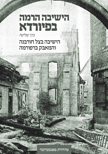25 Tishrei 5771
הישיבה הרמה בפיורדא
The Yeshivah Ramah of Fürth (Hebrew)
The City of Torah in Southern Germany and its Scholars
by Rav Binyomin Shlomo Hamburger
Bnei Brak, 5770
3 vols., 1868 pages
Distributed by Yefe Nof-Feldheim. Available in fine Jewish bookstores.
(Please note: The illustrations appearing in color in the sample pages below do not appear in color in the printed books.)
Vol. 1: Our Rabbis the Rishonim in Nirenburg and their Continuation in Fürth: Table of Contents | Sample Pages
Vol. 2: The Period of its Flourishing: Table of Contents | Sample Pages
Vol. 3: The Yeshivah in the Shadow of its Destruction and the Struggle against the Reform: Table of Contents | Sample Pages
"Yeshivah Ramah" was the term used to describe what today would be considered a respected "Yeshivah Gedolah". The Fürth Yeshivah was not the largest in Germany, nor was it the oldest or most renowned. Neverthless, it was still sizeable, very well-known and a veteran institution. At its zenith, student enrolment reached around six hundred, a number that not one of the Eastern European Yeshivos could boast of, even during their flourishing years before the Holocaust. This was during an era in which European Jews were few among the masses and travel was arduous. It was a period in which German Jewry had diminished significantly because so many had fled anti-Jewish edicts and had emigrated over hundreds of years to Eastern European countries, thereby establishing the German, Yiddish-speaking Diaspora.
Many Gedolei Yisrael, some of whom were famous the world over, stood at the helm of the Fürth Yeshivah, and over the course of centuries since its founding, thousands of Talmidei Chachamim and Torah luminaries frequented the Yeshivah in their youth. Nevertheless, almost nobody today knows that there was once a Yeshiva with the difficult-to pronounce name "ישיבת פיורדא" ("Yeshivas Fiorda").
It is an historical injustice to the many Yeshivos of Germany, of which we are almost completely ignorant. "Who are these, whose waters we drink, yet of whose names we make no mention?" German Yeshivos, which disseminated Torah to Jews everywhere, from the times of Rabbeinu Gershom Me'or HaGolah, until the days of the Chasam Sofer, the Aruch LaNer and their students, have been all but forgotten. Ashkenaz is the birthplace of the Yeshivos of all Ashkenazim throughout the generations, and the Yeshivah of Fürth is a prime example.
Great effort has been made in this book to depict the venerated Roshei Yeshivah who transmitted Torah in Fürth, and their biographies appear in full. Special attention is given to the final period of the Yeshivah's existence, when the heads of the Yeshivah waged a mighty battle against the Reform movement, which attempted to have it shut down, as well as the government, which eventually forced the Yeshivah to close its doors. The German authorities' legislation against the Yeshivos was harsher than that of the Russian Czar, which was similarly enacted in those times, but which encouraged new Yeshivos in Eastern Europe to thrive, since their students found refuge there from forced conscription to the Czar's army. Hitherto unknown incidents in this tragic portion of Jewish history have been explored in depth.
This book is a small window into a magnificent world, memories which are an integral part of our spiritual and religious existence. It examines the Yeshivah against the background of the glorious Kehillah that blossomed in Fürth, and places the Yeshivah and its leaders in the context of many events that befell the Jews of Ashkenaz.
Before us is spread the history of German Jewry—from the vantage point of the Fürth Yeshivah.



